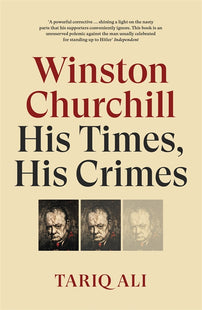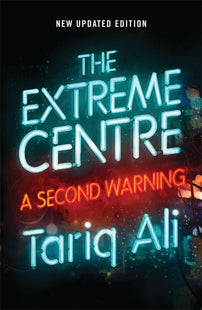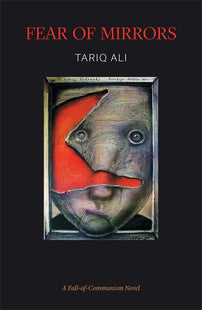On the Churchill Front in the Culture Wars
Historian John Newsinger responds to Simon Heffer and Andrew Robert's review of Tariq Ali’s powerful new demolition of the Churchill myth, Winston Churchill: His Times, His Crimes.

Tariq Ali’s new book, Winston Churchill: His Life, His Crimes, has absolutely predictably been seized upon by Conservatives and their newspapers as a weapon in the ‘culture wars’ that they are doing their very best to incite. The culture wars are, they hope, a way to distract attention from the both their ideologically driven incompetence, their open corruption and their full-blooded assault on the living standards and working conditions of working class and middle class families, accompanied by the continued dismantling of the welfare state. It is worth noticing here that at the recent Police Federation conference, there were police officers complaining to an unmoved Home Secretary of having to use food banks to feed their families! Such is the state of Britain under the Johnson government. They certainly don’t want to encourage people to actually read the book for themselves and to make up their own minds regarding the case that Ali presents. Instead, they want to discredit the book and its author, that goes without saying, but also to use it to rally the troops for the culture wars. Churchill is the greatest Briton, the embodiment of Britishness, of everything that made Britain Great , indeed the Conservative Party itself is a Churchillian enterprise, and Ali’s book is yet another example of how the left threaten all that. Forget about the cost of living crisis, the country faces a bigger threat: Churchill is being called to account for his crimes. Of course, it won’t work despite the best efforts of the Daily Telegraph and one can only wonder how much British Conservatives must envy the success of the Republican right in the United States in propagating their culture wars agenda, but we must never drop our guard.
One problem they have in attacking Ali’s book is that almost without exception right-wing commentators praised an earlier account of Churchill and his times, The Churchill Factor, written by a certain Boris Johnson. This wholly execrable best-selling volume is without doubt one of the worst biographies of Churchill ever written. Even though he had the assistance of a reputable historian, Warren Doktor, when ‘writing’ the book, Johnson still produced a wholly contemptible volume that would be a positive embarrassment to anyone other than our current Prime Minister. One of Johnson’s most insightful criticisms of Churchill is that the man had ‘fewer notches on his bedpost than you might expect from a man whose appetites…were generally so titanic’. To be fair, Johnson does go on to make clear that Churchill was not ‘some sort of asexual Edward Heath-like character’, which would have been just too much and would probably have disqualified him from Great Man status. Still Johnson deserves credit for being the only Churchill biographer to ever make this point about Churchill’s lack of sexual prowess. How did the right-wing historian Andrew Roberts assess the book? He hilariously praised Johnson for his ‘very deep and wide reading in Churchill’s own books, articles and speeches’ and summed the book up as an ‘excellent primer for those who know little about Churchill and wish to be entertained royally’. The book was ‘Fun’. Really! Johnson, as is well-known, is someone who bears a grudge and whom it is inadvisable to make an enemy of, but even so…
Having handled Johnson with kid gloves, it was Andrew Roberts who the Spectator turned loose on Tariq Ali’s book. In its 14 May issue, the magazine carried his review, ‘What the Marxist Tariq Ali gets wrong about Winston Churchill’. He accuses Ali of parroting various critics of the Empire and critics of Churchill or as he puts it ‘every earlier revisionist slur’ put about by the likes of Richard Gott, Caroline Elkins, Clive Ponting, Madrushee Mukerjee…and David Irving. Nicely done slipping Irving in their like that. Guilt by association! Always worth a go when you are short of actual argument. He does not seriously engage with the case that Ali presents, but rather seeks to discredit him, seriously insisting that as far as Churchill was concerned the British Empire ‘was an honourable institution…which brought to many millions a happier, safer and more prosperous life through being part of the British family of peoples and races’. Roberts, it is safe to assume, endorses this view. He writes with some outrage that to try and condemn the British colonialists, ‘often of strong Christian faith and high morals, as bloodstained exploiters and murderers is simply Marxist propaganda’. This display of wilful ignorance is pretty impressive. He does, however, make the valid point that Churchill actually condemned the Amritsar massacre of April 1919, but fails to mention that at the same time he was setting up a murderous reprisal policy in Ireland. Massacre was counter-productive, but murder was not a problem. He goes on to casually dismiss Churchill’s role in the Bengal Famine of 1943-44 as both ‘under-researched and misleading’. This is particularly disgraceful but is really the only way that right-wing historians can deal with this particular episode. The death through starvation, exposure and disease of perhaps as many as five million men, women and children constitutes such an indictment of the British Empire that it cannot be confronted but has to be brushed away, dismissed as ‘under-researched and misleading’. Indeed, we can actually agree that the Famine is ‘under-researched’, but there is a good reason for that. It is too big a crime to be compatible with a benign narrative of Imperial history so it has been suppressed! This is why history after history of the British Empire and biography after biography of Churchill failed to even mention it until quite recently. In fact until pretty much after the publication of Mukerjee’s Churchill’s Secret War in 2010. Johnson’s biography obviously doesn’t acknowledge the Famine.
[book-strip index="1" style="buy"]What particularly excites Roberts though is Kenya and the ‘Mau Mau’ Emergency. He singles out Caroline Elkins as the main culprit here. Given how excited he gets about Ali’s book, one can only be worried that her recent book, Legacy of Violence: A History of the British Empire, might actually give him a heart attack! Churchill, Roberts insists, did not know of the brutal methods being used in Kenya to suppress the insurgency and indeed a case can be made that British atrocities did worsen as the Emergency went on under the Eden and Macmillan governments. Nevertheless, Churchill knew enough to actually object to the possession of incendiary materials being made a capital offence, pointing out quite correctly, one suspects, that in Kenya this would lead to people being hanged for the possession of matches. He also complained about too many prisoners being hanged at the same time which was giving the appearance of mass executions, something to be avoided if possible as it might put British repression in a bad light. It is worth remembering that people, many of them framed anyway, were hanged for the possession of firearms and even for the administration of illegal oaths. This was in the 1950s. Roberts also makes clear that as far as he is concerned the 1953 overthrow of the Mosaddegh government in Iran by a CIA-MI6 sponsored coup was a good thing.
And, of course, there is no Churchill cult anyway, a claim that flies in the face of the continual publication of book after book about the Conservative Party’s great hero and Boris Johnson’s continuing attempt to make the cult his own. The books critical of Churchill are, it is worth pointing out, absolutely dwarfed by the huge number celebrating the man and every aspect of his life. As for Tariq Ali’s book, according to Roberts, it fails to convict his hero, its ‘bile and evident malice fail to persuade’ and ‘Churchill’s reputation emerges unscathed from this onslaught’. The reality is, however, that what Roberts finds most offensive, is the book’s great strength: its politics. Winston Churchill: His Life, His Crimes is informed throughout by Ali’s Marxism and by his years of experience as a revolutionary socialist. This marks it out from most of Churchill’s other critics and is what makes it essential reading. One last point, Roberts does not attempt to deny Churchill’s racism, probably because he was among the first to establish that the man was indeed a wholehearted unrepentant racist in his 1994 book, Eminent Churchillians.
Ali has also somewhat predictably been savaged in the Daily Express and the Daily Telegraph. Writing in the Express, David Williamson quotes a variety of right-wing commentators criticising Ali. Among them is Michael Fabricant MP who is, as usual particularly stupid, insisting that until Ali has saved a nation ‘from an evil fascist invasion…he can keep his opinions to himself’. He is joined by Robert Oulds of the Bruges Group who criticises Ali for misusing the freedoms that he owes to Churchill winning the Second World War and of ‘murdering rather than learning from the past’. Once again, stupid and proud of it. Which brings us to the inimitable Simon Heffer, journalist and professorial research fellow at Buckingham University no less. Writing in the Telegraph, he dismisses Winston Churchill: His Life, His Crimes as ‘a Marxist insult to history’ and Ali himself as ‘a controversialist of the sort to be found in most of Britain’s saloon bars’. He then cleverly corrects himself because Ali is apparently more comfortable in the salon than the saloon bar. Wow! Now that is right-wing journalism at its sharpest! Always good to get in a decent smear like that, dressed up as wit, but not quite making it on this occasion. Anyway as Heffer goes on to make clear, criticism of Churchill is perfectly legitimate, just not criticism from a Marxist perspective. Like Roberts he is really put out by criticism of Churchill over the Kenya Emergency and he inevitably attempts to come to the great man’s defence regarding the Bengal Famine. In the end though, as far as he is concerned Ali’s main objection to Churchill is that he was not ’a Marxist revolutionary’. This is, of course, just so much rubbish. To be fair to Heffer (not sure why!) he did savage Johnson’s The Churchill Factor when it was published, describing it as merely the ‘latest hagiography’ and as a ‘self-regarding travesty of a biography’. Heffer, one feels certain, sooner or later intends to inflict his own Churchill biography on the world.
Obviously these attacks on Winston Churchill: His Life, His Crimes are themselves very much a recommendation for the book. It must be worth reading if these people dislike it so much. In fact, the book is much better than that. What Tariq Ali has written is a powerful account of Churchill from the perspective of class struggle and colonial revolt and resistance. This is something new. The book is informed throughout by revolutionary politics and by his years of experience as a revolutionary. His sympathy with those Churchill was concerned to repress, beat down and keep subordinate runs throughout the book and he takes the time to commemorate many of the forgotten fighters against exploitation and oppression. This is obviously sacrilege as far as the Churchill cultists are concerned, but It is this that makes it both a compelling and informative read and it is this that people like Roberts find most threatening. One can be absolutely confident that as resistance to the Johnson government grows and intensifies more and more people will become open to, indeed will embrace Tariq Ali’s demolition of the Churchill myth and the cult that it has spawned. The book is a valuable weapon in the struggle, an important contribution to exposing the real character of British Imperialism, of colonial rule and of that champion of the Empire, Winston Churchill.
[book-strip index="2" style="display"]





